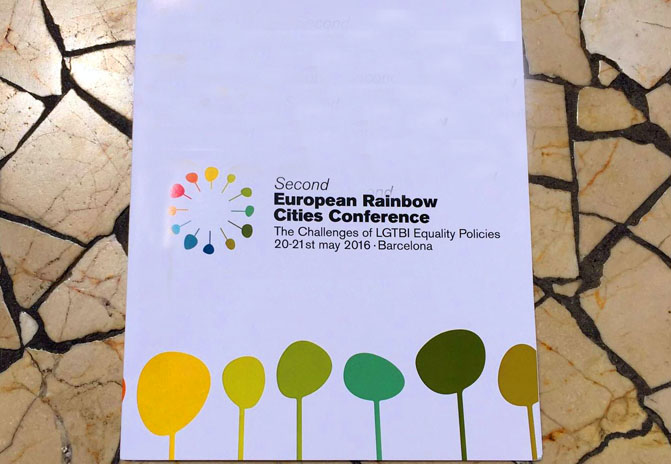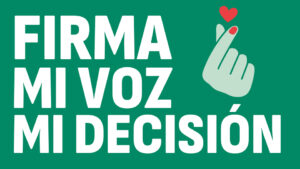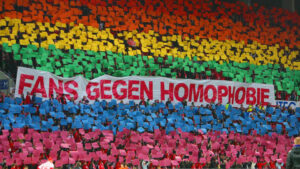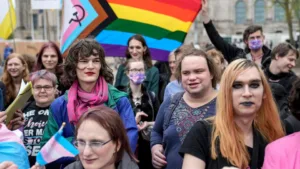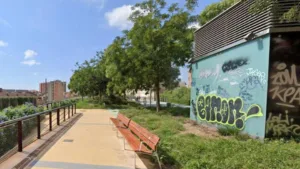GAYLES.TV.- This weekend, coinciding with the celebration of International Day against Homophobia and Transphobia, the second congress has been convened in Barcelona European Rainbow Cities that has gathered in the emblematic Casa MilaPopularly known as La Pedrera to a score of European experts to discuss policies for sexual and gender diversity.

The organization has been run by the University of Vic-Central University of Catalonia with collaboration from the Barcelona City Council, the Diputación de Barcelona and the Department of Labor, Social Affairs and Families of the Generalitat de Catalunya.
The Congress is a space for meeting, debate and exchange of experiences and knowledge in the context of public and local equality policies against LGTBIphobia, especially those that unfold in non-metropolitan environments. This year's presentations have focused on two main themes: the situation of LGTBI people in rural settings and issues affecting the transgender community.
At the opening of the Congress, the rector of the University of Vic - Central University of Catalonia, Jordi Mountain, has valued the importance of combining research and knowledge transfer to advance understanding, acceptance and respect of sexual and gender diversity. Even so, he added that, "although the full social normalization of the trans perspectives is still a complex project, the bases are becoming very solid".

Laura Pérez, Councilor of the Life Cycle, Feminisms and LGTBI of the City Council of Barcelona, remarked that "cities can be spearheads and the ideal space for the deployment of committed public policies that confront the different forms of discrimination". Mireia Mata, general director of Equality of the Department of Labor, Welfare and Families of the Generalitat de Catalunya, has emphasized the Law 11 / 2014 that has been defined as "a law of all citizens: everyone is a beneficiary". The deputy delegate of Equality and Citizenship of the Diputación de Barcelona, Antoni Garcia, has described this law as a pioneer and has said that "municipalism has to play a key role in its deployment, through plans adapted to the dimensions of the different towns and cities."
Gerard Coll Planas, Coordinator of the Congress and main researcher of the Research Group «Gender Studies: Translation, Literature, History and Communication» (GETLHIC) of the UVic-UCC, talks about the invisibility of the LGTBI collective outside the big cities and the fact that " Coming out of the closet directly involves the entire family environment, something that leads many people to live in hiding, to leave or to lead a double life ”. Experiences from the Canary Islands, regions of Catalonia, the collective Agrogay of Ulloa in Galicia or the program Movisie of the Dutch Center for Social Development.
The other big block has referred to the increase in bullying that for reasons of sexual diversity and gender suffer many people, especially worrying among children and young transsexuals that, beyond the educational centers ends up translating into discrimination in work environments. Miquel Missé, coordinator of the Congress and researcher of the GETLHIC Research Group of the UVic-UCC, has affirmed that "at school, the so-called LGTBIfòbia is basically discrimination based on gender."
The conclusions reached at this second European Rainbow Cities Congress have been: firstly to appeal to all administrations to  to work in a coordinated manner articulating the work done to encourage cooperation. "Currently the administration addresses the different axes of discrimination separately when in practice people are a crossroads of all of them and, therefore, the specific problems are not distinguishable or isolatable," said Gerard Coll Planas.
to work in a coordinated manner articulating the work done to encourage cooperation. "Currently the administration addresses the different axes of discrimination separately when in practice people are a crossroads of all of them and, therefore, the specific problems are not distinguishable or isolatable," said Gerard Coll Planas.
The speakers also warn about the lack of studies as a basis for designing equality policies. And finally, the development of public policies in rural settings is set as a priority.
The II Congress European Rainbow Cities It has had 300 people registered and waiting list for weeks.
 Among the attendees there are technicians and politicians from the municipal area, researchers and activists like, Lucas Platero, Doctor of Political Science and Sociology, Surya Monro, Professor of Sociology and Social Policy at the University of Huddersfield in the United Kingdom, Juul van Hoof, director of the LGTB program at Movisie in the Netherlands, Patricia G. Ojeda, sociologist and responsible for LGTBI projects in the Public Administrations of the Canary Islands, Gabriel Reboredo, member of the Agrogay collective of A Ulloa de Galicia, Florencio Chicote of the LGTBI unit of the Berlin State Office, Cristina Garaizabal, coordinator of the Report on the model of assistance and assistance to trans people in Barcelona, Raoul Galarraga, responsible for LGTBI Policies of Amsterdam, Marta Cruells, senior adviser of the Department of Life Cycle, Feminisms and LGTBI of the Barcelona City Council, Simona Topolinjak, adviser to the Department of health and social assistance of Ljubliana, Gemma Garcia, responsible for the LGTBIQ Council of the City of Terrassa.
Among the attendees there are technicians and politicians from the municipal area, researchers and activists like, Lucas Platero, Doctor of Political Science and Sociology, Surya Monro, Professor of Sociology and Social Policy at the University of Huddersfield in the United Kingdom, Juul van Hoof, director of the LGTB program at Movisie in the Netherlands, Patricia G. Ojeda, sociologist and responsible for LGTBI projects in the Public Administrations of the Canary Islands, Gabriel Reboredo, member of the Agrogay collective of A Ulloa de Galicia, Florencio Chicote of the LGTBI unit of the Berlin State Office, Cristina Garaizabal, coordinator of the Report on the model of assistance and assistance to trans people in Barcelona, Raoul Galarraga, responsible for LGTBI Policies of Amsterdam, Marta Cruells, senior adviser of the Department of Life Cycle, Feminisms and LGTBI of the Barcelona City Council, Simona Topolinjak, adviser to the Department of health and social assistance of Ljubliana, Gemma Garcia, responsible for the LGTBIQ Council of the City of Terrassa.
And the moderators Fran Sánchez, Councilor of LGTBI Policies of the City Council of Ripollet, Andreu Agustín, director of the LGTBI Plan of the Barcelona City Council and Sílvia Casola, Adviser of Equality and Citizenship of the Diputación de Barcelona.
In the framework of the Congress also a part of the work was represented Limbo, creation of The ImpluxiblesDirected by Miriam Escurriola.
In short, this is a great opportunity, which has been defined by the organizers as "a toolbox to share ideas and resources that can then be applied to each territory".
GAYLES.TV
Online TV

